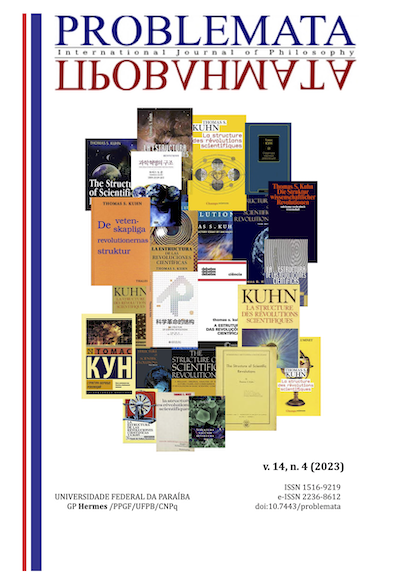TRANSLATION IN KUHNIAN PHILOSOPHY:
PARTIAL TRANSLATION AS A PATH OF CONCILIATION BETWEEN INCOMMEASURABLE THEORIES
DOI:
https://doi.org/10.7443/problemata.v14i4.67369Keywords:
Thomas Kuhn, Partial translation, Intradutibility, Fuzzy logicAbstract
This work has as its theme the translation in kuhnian philosophy, considering the problem of the proposal of intradutibility advocated by Kuhn to present an alternative to the theme in question. The problem here is about the possibility of translation between theories or languages, through a partial translation or fuzzy translation. The proposed thesis is that there is the possibility of a partial translation, from the application of fuzzy logic, which makes possible the multi-value of variable within a linguistic community, as well as between linguistic communities. This proposal is an attempt to correct the various misunderstandings that Thomas Kuhn's philosophy suffered, putting in the scenario of philosophy of science and language a Philosophy of Uncertainty.
Downloads
References
DAVIDSON, Donald. On the very idea of a conceptual scheme. Proceedings and Addresses of the American Philosophical Association, v. 4, p. 5-20, 1973.
FEYERABEND, Paul. Contra o método. 2. ed. São Paulo: Unesp, 2011.
GENTILE, Nelida. La tesis de la inconmensurabilidad: a 50 años de La estructura de las revoluciones científicas. Buenos Aires: Eudeba, 2013.
GHIRALDELLI, Paulo. Para compreender a Filosofia de Donald Davidson. São Paulo: 2007. Versão Experimental.
KITCHER, Philip. Theories, Theorists and Theoretical Change. The Philosophical Review, v. 87, n. 4, p. 519-547, oct., 1978.
KITCHER, Philip. Implications of Incommensurability. Proceedings of the Biennial Meeting of the Philosophy of Science Association, v. 2, p. 689-70, Symposia and Invited Papers,1982.
KUHN, Thomas. The road since structure: philosophical essays, 1970-1993, whit and autobiographical. Chicago: The University of Chicago Press, 2000.
KUHN, Thomas. Posfácio. In: KUHN, Thomas. A Estrutura das Revoluções Científicas. 13. ed. São Paulo: Perspectiva, 2017.
KUHN, Thomas. Reflexão sobre os meus críticos. In: LAKATOS, Imre; MUSGRAVE, Alan (Org.). A crítica e o desenvolvimento do conhecimento. São Paulo: Cultrix, 1979. p. 285-343.
MORRIS, Michael. An Introduction to the Philosophy of Language. Cambridge: Cambridge University Press, 2007.
QUINE, W. O. Palavra e Objeto. Petropólis: Vozes, 2010.
QUINE, W. O. Ontological Relativity. The Journal of Philosophy, v. 65, n. 7, p. 185-212, Apr. 1968.
SANKEY, Howard. The Incommensurability Thesis. Brookfield, Avebury Series in Philosophy of Science, 1994.
SANKEY, Howard. Incommensubility and the Language of Science. In: SANKEY, H. Scientific realism and the rationality of Science. Burlington: Ashgate, 2008.
SANKEY, Howard. Kuhn's Changing Concept of Incommensurability. British Journal Phillophy Science, Great Britain, v. 44, p.759-774, 1993.
SCHEFFLER, Israel. Science and subjectivity. Indianapolis: Bobbs Merrill, 1967.
SHAPERE, Dudley. Meaning and Scientific Change. In: SHAPERE, Dudley. Reason and the Search for Knowledge. Dordrecht: D. Reidel Publishing Company, 1984, p. 58-101.
Downloads
Published
Issue
Section
License
Copyright (c) 2023 Francidilso Nascimento

This work is licensed under a Creative Commons Attribution 4.0 International License.
Authors who publish with this journal agree to the following terms:
- Authors retain copyright and grant the journal right of first publication with the work simultaneously licensed under a Creative Commons Attribution License that allows others to share the work with an acknowledgement of the work's authorship and initial publication in this journal.
- Authors are able to enter into separate, additional contractual arrangements for the non-exclusive distribution of the journal's published version of the work (e.g., post it to an institutional repository or publish it in a book), with an acknowledgement of its initial publication in this journal.
-
- Authors are permitted and encouraged to post their work online (e.g., in institutional repositories or on their website) prior to and during the submission process, as it can lead to productive exchanges, as well as earlier and greater citation of published work (See The Effect of Open Access).





